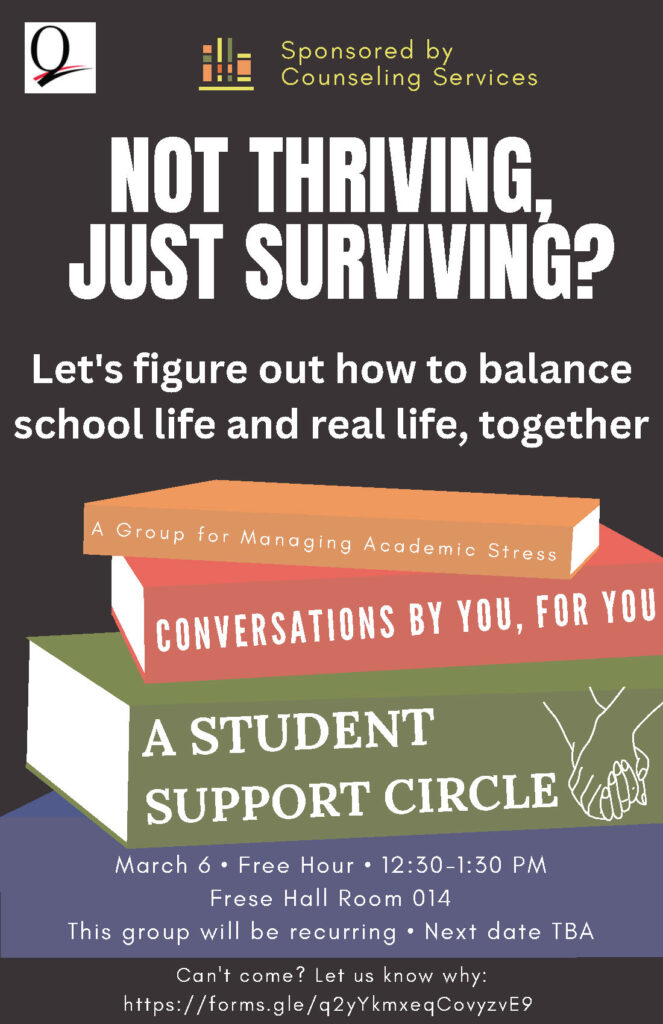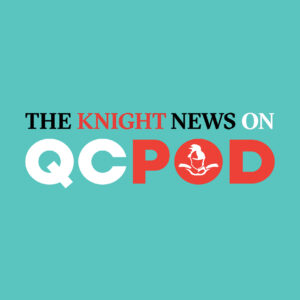If you wan to choose QC POD as the series your podcast belongs to, you can find what you need here.
Author Archives: Jason Tougaw
Workshop Guidelines–Interview Episode Rough Cuts
As you read your group members’ posts and listen to their episodes, make notes about the following:
- Are all the elements from the Interview Episode Checklist there? Do any still need to be created or included?
- Does the intro get you interested in the topic? Does it make you want to keep listening?
- What story unfolds through the interview? Are there any sections that detract from the story or feel extraneous?
- What are your favorite elements or moments?
- How is the sound quality? Do any elements of sound distract you from the story? Do any elements of sound design really work to keep you engaged? Do you have any suggestions for the sound design or for improving sound quality?
- Does the length feel right? Is it too long? Too short?
For Thursday’s Class
Listen to the assigned episodes of Kai Wright’s Notes on America and Krista Tippett’s On Being. Pay attention to the following and take notes with time stamps:
What editing techniques do you notice now that you have a little experience with editing?
How do the interview techniques mesh with the editing–and vice versa?
How do these editing techniques contribute to the tone of the show–and to your experience?
How would you describe the tone of the show / episode?
Who is the audience for the episode?
What are the episode’s motives?
How are audience and motive reflected in one-liners and episode descriptions?
Note: These are elements you’ll want to think about as you develop your first episode.
Support from the Counseling Center

One-Liners
Show One-Liners
QC POD: The people and ideas that make the Queens College Community
First-Person: Every opinion starts with a story. Intimate conversations about the big ideas shaping our world, hosted by journalist Lulu Garcia-Navarro.
La Brega: There’s no direct translation of “la brega” in English, but for Puerto Ricans, it’s a way of life. To bregar means to struggle, to hustle, to find a way to get by and get around an imbalance of power. It’s got a creative edge, a bit of swagger; as Puerto Rican scholar Arcadio Diaz has observed, it’s a word that belongs to the underdog.
99% Invisible is a sound-rich, narrative podcast hosted by Roman Mars about all the thought that goes into the things we don’t think about — the unnoticed architecture and design that shape our world.
The Turnaround is a show about our greatest living interviewers, hosted by Jesse Thorn and produced by Maximum Fun and Columbia Journalism Review.
Episode One Liners
QC POD’s Eden Ayala explores our obsession with the true crime genre.
Logan Lane gave up her smartphone. That changed her life.
La Brega, Lisa Lisa, “I Wonder If I Take You Home”: When Lisa Lisa asked the question, she inspired an entire generation of young women to start talking.
Code Switch, “Reckoning With The NFL’s Rooney Rule”: The large majority of NFL players are people of color. The coaches on the sidelines? Not so much. In this episode, we’re looking at the NFL’s famous diversity plan and what it might tells us about why so many corporate initiatives like it don’t work.
Episode Descriptions
The Turnaround: Today’s guest is Reggie Ossé, also known as Combat Jack. He’s the host of The Combat Jack Show, one of the best hip-hop podcasts around. On the show, Reggie chops it up with a who’s who of the rap world, not only about music, but about race, politics, and a whole lot more. Reggie says he kind of fell into interviewing for a living. He’s actually a lawyer by training and used to represent some of the biggest hip-hop stars, even Jay-Z. Because he’s been immersed in the culture for decades, he brings to each conversation a deep knowledge and respect for his subject that few interviewers can match.
First-Person: How many hours do you spend on your phone each day? Probably more than you’d like. In our technology-saturated world, we rely on our devices for what feels like an endless list of daily tasks — everything from staying up-to-date on Twitter to killing time at the post office. The idea of reclaiming any degree of independence from our smartphones can often feel impossible.
For the 17-year-old Logan Lane, the solution was to quit cold turkey. Lane grew up in Brooklyn and was a screen-addicted teenager who spent hours curating her social media presence on Instagram and TikTok. Then, a little over two years ago, Lane started questioning whether living a life of constant connection was actually a good thing and made the decision to ditch her smartphone altogether. She began assembling a “Luddite Club” — a group of teenagers who reject technology and its creeping hold on all our lives.
Feedback for Workshop Groups
Your feedback on your workshop group’s blueprint posts is due today. Consider the following as you read and comment don their posts:
- Would you listen to an episode like this? What would draw you in? Is there anything the creator can do to capture your attention more immediately?
- Is the episode concept focused? Would narrowing it make it more effective?
- Will some of the interview questions elicit stories from guests?
- How might the one-liners be sharpened or made more lively?
Of course, you may have other ideas for feedback. This is just a guide.
In-Class Workshop: Motive, Blueprint, One-Liner, and Questions (2/16)
-
What are some of the motives for your episode? Discuss these with the group.
-
Using the template on pp. 35-36 of The NPR Startup Guide, write a draft of a “blueprint” for your episode (or series). Then sketch out an idea (or two) for a logo. After that, draft a one-liner to describe your episode. Share these with your group and discuss.
-
Based on the templates on p. 105, make a list of sounds you hope to include and make notes about your interviewee / guest
-
Based on the discussion on pp. 160-161, write up a quick draft of some interview questions. Share and discuss these with the group.
Preparing for Class Thursday 2/16
Preparing for class tomorrow is pretty straightforward:
- Be sure you fill out a Podcast Analysis Worksheet for the episode of Lulu Garcia Navarro’s First Person. I gave out hard copies in class, and I’ve posted a PDF to the calendar and to our Documents page.
- In Weldon’s NPR Startup Guide, review p. 35-36 on blueprints, one-liners, and titles, p. 136 on sound collection worksheets and 105 on sound collection lists and interview lists, and 160-161 on interview questions.
- On the Calendar, review what’s due Friday and Tuesday.
That’s it!
Sample Layout for Your Episodes–TITLE HERE
 QC POD is about the people, products, and ideas that make the Queens College Community.
QC POD is about the people, products, and ideas that make the Queens College Community.
Jason Tougaw sits down with NPR Music critic Ann Powers.
Ann Powers was a guest in The Knight News Visiting Journalists Series. Afterwards, she sat down with Jason Tougaw to talk music towns, the role of pleasure and love in music criticism, the racial politics of American music, her close encounters with Prince, Tori Amos, and Bono—and a whole lot more.
Ann Powers is NPR Music’s critic and correspondent. She writes for NPR’s music news blog, The Record, and she can be heard on NPR’s news magazines and music programs. One of the nation’s most notable music critics, Powers served as chief pop music critic at the Los Angeles Times from 2006 until she joined NPR in 2011. From 1997 to 2001 Powers was a pop critic at The New York Times and before that worked as a senior editor at the Village Voice. Powers’s books include Weird Like Us: My Bohemian America and Good Booty: Love and Sex, Black and White, Body and Soul in American Music.
Group Activity for Class Tuesday 2/14
You’ll do a group activity and presentation in class on Tuesday. See groups on the calendar.
Before Class
As a group, choose an episode of The Turnaround that we haven’t listened to together. See email addresses below to get in contact. Listen to the episode and take careful notes with time stamps.
- Compare notes and prepare a presentation on what we might all learn from the interview.
- Ask yourselves the following questions:
- What new ideas does your chosen interviewer bring to the discussion?
- What ideas resonate with other interviews we’ve listened to?
- What does the guest have to say about preparation, research, writing questions, their aims, rapport with guests, storytelling, and audiences?
- For your presentation, Introduce the episode and guest–and explain why you chose it
- Choose a moment from the episode you want the rest of us to listen to.
- Tell us why you chose that moment. What can we learn from it?
- Talk about interview techniques you want to try with your own episodes.
Kate Chen <katechen47850@gmail.com>,
Angelina D’Orta <ANGELINA.DORTA91@qmail.cuny.edu>,
Kristina Dawoud <kristina.dawoud98@qmail.cuny.edu>,
Shmyah Hoppie <shmyahhoppie423@gmail.com>,
Eduardo Ibanez <eduardo.ibanez04@qmail.cuny.edu>,
Grazelle Juanillio <grazelle.juanillo95@qmail.cuny.edu>,
Torri Little <tslittlegs@hotmail.com>,
“Carlos Montoya, Jr.” <klosemontoya@gmail.com>,
Alessia Pisicchio <apisicchio@queensmetro.com>,
Edwin Ramirez <edwin.ramirez65@qmail.cuny.edu>,
Tatjana Razai <tatjana.razai49@qmail.cuny.edu>,
Loida Rivera <loidarivera97@gmail.com>,
Monica Sarduy <monicasarduy417@gmail.com>,
Holden Velasco <holdenvelasco@gmail.com>,
Arianna Arce <arianna.arce71@qmail.cuny.edu>

